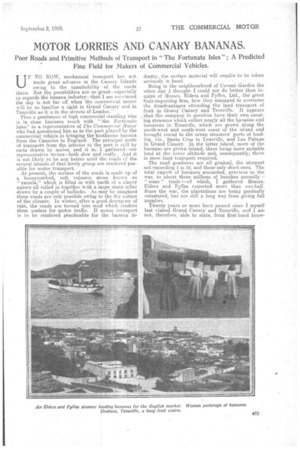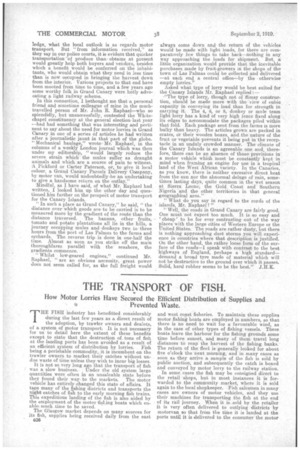• MOTOR LORRIES AND CANARY BANANAS.
Page 13

Page 14

If you've noticed an error in this article please click here to report it so we can fix it.
Poor Roads and Primitive Methods of Transport in "The Fortunate Isles " ; A Predicted Fine Field for Makers of Commercial Vehicles.
UP TO NOW, mechanical transport has not made great advance in the. Canary Islands owing to the unsuitability of the roads there. But the possibilities are so great—especially as regards the banana industry—that I am convinced the day is not far off when the commercial motor will be as familiar a sight in Grand Canary and in Teneriffe as it is in the streets of Londou."
Thus a gentleman of high commercial standing who is in close business touch with "the Fortnuate Isles" to a representative of The Commercial Motor who had questioned him as to, the part played by the commercial vehicle in bringing the toothsome banana from the Canaries to England.. The principal mode of transport from the interior to the port is still by carts drawn by mules, and it is,. I. gathered—our representative writes—both slow and costly. And it is not likely to be any better until the roads of the several islands of that lovely group are rendered possible for motor transport.
At present, the surface of the roads is made up of a honeycombed, soft volcanic stone known as " escoria," which is filled in with earth of a clayey nature all rolled in together with a large stone roller drawn by a couple of bullocks. As may be imagined these roads are only possible owing to the dry nature of the climate. In winter; after a good downwmr of rain, the roads are turned into mud which renders them useless for motor traffic. If motor transport is to be rendered practicable for the banana in dustry, the surface material will require to be taken seriously in hand.
Being in the neighbourhood of Covent Garden the ether day I thought I could not do better than inquire of Messrs. Elders and Fyffes, Ltd., the" great fruit-importing firm, how they managed to overcome the disadvantages attending the land transport of fruit in Grand Canary and Teneriffe. It .appears that the company in question have their own coasting steamers which collect nearly all the bananas and tomatoes in Teneriffe, which are grown along the north-west and south-west coast of the island and brought round to the ocean steamers' ports of loading, viz., Santa Cruz in Teneriffe, and Las Palmas in Grand Mnary. In the latter island, more of the bananas are grown inland, there being more suitable land at the lower altitude and, consequently; there is more land transport required. The road gradients are all gradual, the steepest not exceeding 1 in 12, and those only short ones. The total export of bananas amounted, previous to the war, to about three millions of bunches annually-" some" trade I—of which, I gathered Messrs.. Elders and Fees exported more than one-half. Since the war, the plantations are being gradually reinstated, but are still a long way from giving full supplies.
Twenty years •or more have passed since I myself last visited Grand Canary and Teneriffe, and I am net, therefore, able to state, from firsthand know ledge, what the local outlook is as regards motor transport. But "from information received," as they say in our police courts, it is evident that quicker transportation o1produce than obtains at present would greatly help both buyers and vendors, besides which a benefit would be conferred on the inhabitants, who would obtain what they need in less time than is now occupied in bringing the harvest down from the interior. Various projects to that end have been mooted from time to time, and a few years ago some worthy folk in Grand Canary were hotly advocating a light railway scheme. In this connection, I bethought me that a personal friend and sometime colleague of mine in the muchtravelled person of Mr. John R. Raphael—who so splendidly, but unsuccessfully, contested the Whitechapel constituency at the general election last year —had had something that was interesting and pertinent to say about the need for motor lorries in Grand Canary in one of a series Of articles he had written after a, journalistic jaunt in that part of the globe. "Mechanical haulage," wroteMr. Raphael, in the columns of a weekly London journal which was then under my editorship, "would largely reduce the severe strain which the mules suffer as draught animals and which are a source of pain to witness. A Pickford or Carter Paterson, or, to give it local colour, a Grand Canary Parcels Delivery Company, by motor van, would undoubtedly,be an undertaking to give a handsome return on the outlay." Mindful, as I have said, of what Mr. Raphael had written, I looked him up the other day and questioned him further on the prospe-ct of motor transport for the Canary Islands.
" In such a place as Grand Canary," he said, "the distance over which goods are to be carried is to be measured more by the gradient of the route than the distance traversed. The banana, other fruits, tomato and potato plantations all lie in the hills, • a journey occupying mules and donkeys two to 'three hours from the port of Las Palmas to the farms and orchards. The reverse trip is done in one-half the time. Almost as soon as you strike off the main thorouglifares parallel with the seashore, the gradients commence.
"Whilst low-geared engines," continued Mr. Raphael, "are an obvious necessity, great power does not seem called for, as the full freight would always come down and the return of the vehicles would be made will' light loads, for there are comparatively few things to take back—nothing in any way approaching the loads for shipment. But, a little organization would provide that the inevitable purchases made by fruit-growers in the shops of the town of Las Palmas could be collected and delivered —at each end a central office—by the otherwise empty lorries." Asked whit type of lorry would be best suited for the Canary Islands Mr. Raphael replied :— ."The type of lorry, though not of flimsy construction, should be made more with the view of cubic capacity in conveying its load than for strength in. carrying it. The 4, 6, or 8, donkey or mule team light lorry has a kind of very high fence fixed along its edges to accommodate the packages piled within that fold. Each package sent from the fauns is more bulky than heavy. The articles grown are packed in crates, or their wooden boxes, and the nature of the fruit or vegetable-prevents it being put in the receptacle in an unduly crowded manner. The climate of the Canary Islands is an agreeable one and, therefore, there can be an absence of those provisions in a motor vehicle which must be constantly kept in mind when framing an engine for use in EL tropical land of the West African variety. In the Canaries, as you know, there isneither excessive direct heat from the sun nor the abnormal deluge of rain, sometimes lasting days, quite common in the wet season at Sierra Leone, the Gold Coast and Southern Nigeria and the other territories in that general geographical area."
"What do you say in regard to the roeds of the islands, Mr. Raphael?" "Well, the roads in Grand Canary are fairly good. One must not expect too much. It is so easy and 'cheap' to be for ever contrasting out of the way places with the large cities of Western Europe or the United States. The roads are rather dusty, but there is nothing approaching dust storms you will experience in countries where that description is justified. On the other hand, the rather loose form of the surface of the roads—I speak with contrast to the best highways of England, perhaps a high standard— demand a broad tyre made of material which will not be destructive to the ground over which it passes. Solid, hard rubber seems to be the best." ,I.H.K.






















